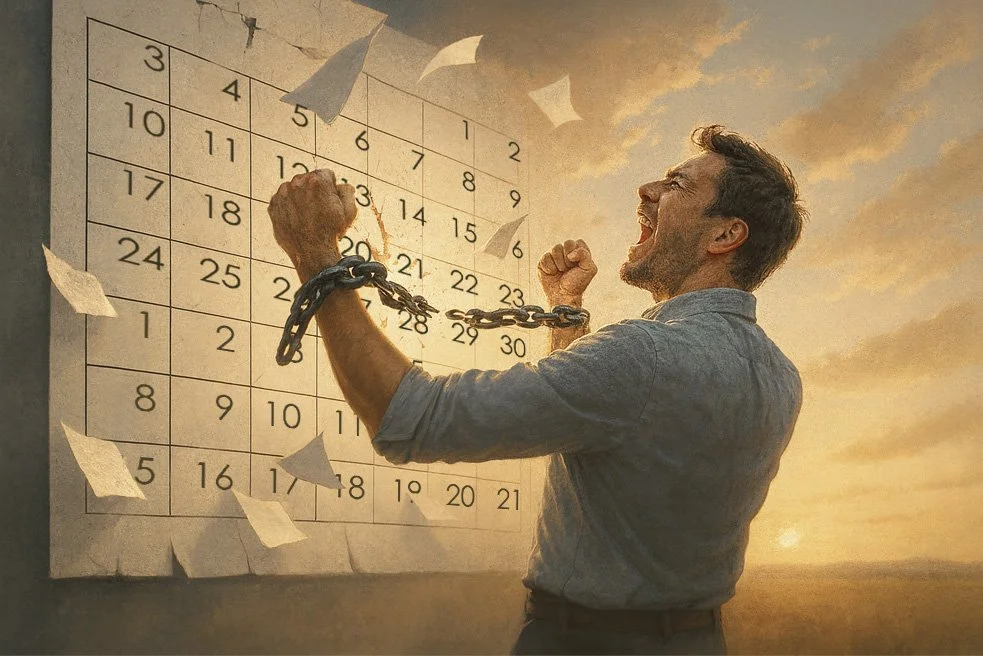If your calendar feels like it belongs to everyone but you, you are not alone. Most of us are trapped in ‘calendar captivity’: meeting after meeting, hour after hour, leaving no oxygen for strategy, reflection, spontaneous co-creation with others, or leadership development. But take heart; cracks are forming in this culture of calendar worship, and the great meeting rebellion has begun!
AN EVERYDAY OBSERVATION
I was recently standing in line at Bridgehead waiting for my tea, when I overheard two men comparing notes about who had more meetings that week. Clearly, it was a competition! They were bragging about whose calendar was more dense, as if a suffocating schedule and meeting fatigue were badges of honour, or the way to prove their value and importance. What a crock. Ever wonder how we got to the point that our working culture has normalised busyness as a way to demonstrate our significance or importance, even when it adds no value? Let’s look at the data.
THE DATA BEHIND IT
Microsoft’s Work Trend Index shows meeting time has tripled since 2020.
Harvard Business School found that 71% of managers consider meetings inefficient.
And a global survey of knowledge workers by Atlassian, the Australian software company behind Jira, Confluence, and Trello, found that employees lose about 31 hours per month to unproductive meetings and communication.
THE NEUROSCIENCE OF MEETING OVERLOAD
Neuroscience also helps explain why endless meetings feel so exhausting. Our brains are not designed to shift focus dozens of times a day, nor to make decisions without breaks or downtime. When calendars are packed with back-to-back meetings, there are several predictable effects that can show up in our brains:
Decision fatigue: Each meeting requires choices, and the prefrontal cortex tires quickly. Later in the day, people tend to make more default or shallow decisions. Leadership experts such as Dr. David Rock of the NeuroLeadership Institute recommend scheduling your most important decisions for the morning, when mental energy is highest.
Directed attention fatigue: Constantly forcing focus drains the part of the brain that helps us manage attention and regulate emotions. When it is overtaxed, our ability to listen generously and respond thoughtfully decreases, which is why people become more irritable, less empathetic, and quicker to snap during back-to-back meetings.
Default mode network: This brain network switches on when we are not focused on a specific task, such as when daydreaming, walking, showering, running, or letting our minds wander. It is critical for creativity, reflection, and for connecting disparate ideas. When calendars are overpacked, the default mode network doesn’t have the chance to activate, which means we lose the mental space where many of our best insights would normally emerge.
PUBLIC EXAMPLES OF PUSHBACK
Shopify made headlines in 2023 by introducing a ‘calendar purge’ in early 2023, cancelling many recurring meetings with more than two people, enforcing a meeting-free day (Wednesdays), and limiting large gatherings. I don’t know if that policy is still in place (perhaps someone from Spotify can chime in below), but at the time, the changes yielded a measurable drop in meeting overload, and it got people talking about meeting necessity.
Deloitte Canada’s hybrid work-research shows employees increasingly value flexibility and well-being, and many describe strain from coordination overload and excessive meetings. Leaders are responding with bold resets: no-meeting days, mandatory agendas, decision-only rules.
WHAT THE REBELLION LOOKS LIKE
Leaders who have begun to push back against calendar overload are not doing it with small tweaks. They are redesigning how time is used, putting in place clear rules and experiments that challenge the default culture of ‘meetings first.’ The rebellion is not about eliminating every meeting; rather, it’s about treating each one as a costly investment of attention that must earn its place on the calendar.
Here are some of the strategies that are gaining traction:
YOUR COACHING CHALLENGE
Reclaim the Calendar
Doing:
For the next two weeks, conduct a personal calendar audit. Label every meeting as one of three types:
A = Action (a decision or choice needs to be made)
C = Check-in (information-only updates needed)
T = Transfer (asynchronous: share documents, Slack, or AI-generated notes).
Cancel or reframe at least one meeting in each category. For example, shift an information meeting into a written update, or shorten a decision meeting by clarifying the decision before it begins.
What to Notice:
When a meeting is labelled as Action, did it truly lead to a clear decision or next step?
For Check-in meetings, did the conversation actually create alignment, or could the same update have been delivered another way?
For Transfer items, what happened when I moved them out of the calendar and into a written or asynchronous channel?
How did my focus, energy, or availability shift as I applied the ACT filter across my schedule?
Reflection Questions:
Which meetings truly belonged in the Action category, and which ones slipped in without a real decision attached?
How much value did my Check-in meetings add, and where did I see opportunities to streamline or shorten them?
What did I learn about the effectiveness of moving Transfer items into asynchronous channels?
How did applying ACT change my sense of control over my calendar?
If I made ACT a habit across my team, how might it shift the culture of meetings in my organisation?
The most radical leadership act of 2025 may be refusing to waste your professional life in bad meetings.
Reach out for a free exploratory Executive Coaching conversation at www.leslierohonczy.com.


